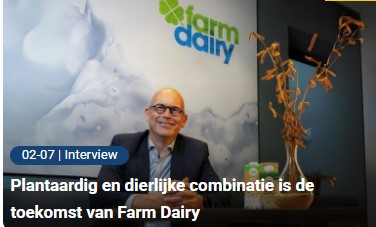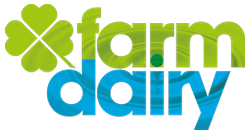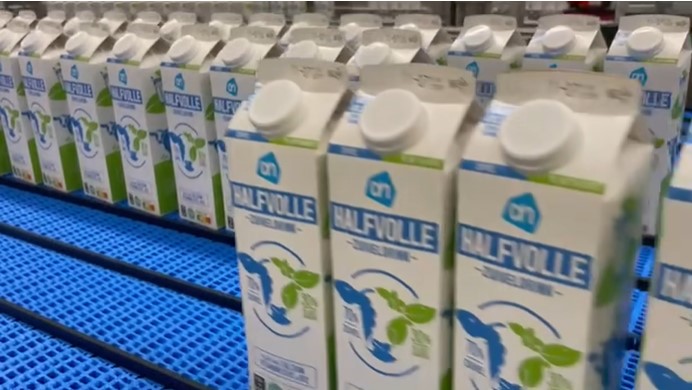

A sample of the full interview:
Plant and animal combination is the future of Farm Dairy
...
House brand milk, custard or yogurt and, since last year, soy yogurt and oat drink: chances are it comes from Farm Dairy. The dairy processor is showing itself to be innovative with
the step into plant-based and with the introduction of the Netherlands' first hybrid dairy product. Protein Trends visited Farm Dairy and learned where the plantbased choices come from.
...
How did the move into plant-based come about?
"A few years ago we were thinking about our strategy: how do we go into the future
? We want to commit to sustainable dairy, but we also saw the demand increase
for plantbased drinks and yogurt. We came up with the mission: better animal-based, more
plant-based. We made our milk streams more sustainable. When that was completed,
we could look at more plant-based.
We can't look into the future, nor do we know where demand will be in a few
years. What we did see is that our customers, the retailers, were looking for a
Dutch producer of plantbased private label dairy products. At
that time, these were mostly produced abroad. The demand for, especially
plantbased products products, increased. The corona crisis exposed the
dependence of our food system. How vulnerable is the chain
when you have plantbased dairy coming from Southern Europe made from U.S. soy? Market demand combined with the opportunity for us to expand resulted in this course. In addition, we have enormous knowledge of milk, yogurt and custard. That helps us produce plantbased products."
What makes Farm Dairy the right party to pick up this production?
"I see Farm Dairy as a chain player. We have insight into supply and demand and can link them together here. We know what ingredients are out there and know what retailers are waiting for. We are an agile organization and can therefore decide fairly quickly to take up something. Within two years, the entire plantbased line was in production. In addition, we have the economy of scale. Start-ups and scale-ups struggle to scale up to commercial volumes, millions of gallons. Because of the scale at which we can operate, we can also be and remain price competitive. Finally, we simply know very well how dairy should taste. Our people have been working with milk and yogurt for years and know exactly how the acidity should be or how creamy something should be. That helps us develop the tastiest plantbased and hybrid products."
What does the facility look like?
"The production facility is flexible: we can process all kinds of raw materials. Right now we produce soy, oats and combined drinks, barista and yogurt products. The total capacity at this stage is 60 million liters per year. With that you can supply a very large part of the Netherlands with plantbased products. The intention is to use the entire capacity for plantbased products, but the lines can also be occupied and with dairy. We have the ideal toolkit in-house to produce the best plantbased and animal-based products ."
...
At the announcement, you indicated that you would like to work with as many local resources as possible. What is the status of that?
"That is still the wish, but the practice is more complicated. Ideally we would like to source raw materials from Flevoland, but that is not yet feasible. Soy is difficult, but oats should be possible. We do join initiatives like the BeanDeal and have good contact with the Protein Farmers of the Netherlands. Right now we buy the ingredients and do look at where they come from with a preference from the Netherlands. In the most ideal scenario, full tankers of plantbased raw materials are also unloaded here, like dairy. As a private-label producer, though, regionality is secondary to price. The most important factors we look at when developing our products are taste, price and nutritional value."
How did the hybrid dairy drink come about?
"A year ago, Albert Heijn came to us asking if it was possible to produce a hybrid dairy drink. The Danish company PlanetDairy, known for its plant-enriched cheese Audu, already had a recipe for this. The company just didn't have the resources to produce it. They came in contact with us for this. The recipe worked on a lab scale, but the translation to commercial volumes was made here."
What were the retailer's requirements for the hybrid dairy?
"The taste was the most important thing. It had to be as close to the milk taste as possible. It had to be as tasty as the regular variety. That worked out well, I think. We also got parameters on price and sustainability. In the end we ended up with a ratio of 30% vegetable in the semi-skimmed variant and 40%in the full."
As someone coming from the dairy industry, how do you see the development of hybrid dairy?
"I see hybrid dairy as a 'best of both worlds' product. The milk in the product is certified sustainable (On The Way To PlanetProof or Better For), but adding plantbased ingredients makes the product even more sustainable. Dairy has important nutritional values and that is missing in plantbased drinks. A few years ago, the idea was that with one big step to plant-based, we would start consuming more sustainably. Practice now seems more recalcitrant. plantbased dairy alternatives do not yet seem to land as well as thought. What we need are intermediate steps instead of one big step. This is where hybrid dairy can play a role. I'm thinking of how the sugar level in custard has been reduced. Step by step. I also believe in that with hybrid dairy. At Farm Dairy, we work with the mission: Better dairy, more plant-based. With small steps, making a big impact."

